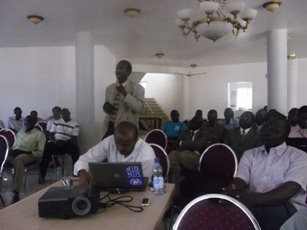Don’t misuse South Sudan’s funds, aid agencies
By Julius N. Uma
September 07, 2011 (JUBA) – A coalition of 38 aid agencies have urged donors not to squander funds meant for South Sudan’s recovery and ensure that the new nation’s key priority needs are fully achieved.

South Sudan gained its independence almost two months ago, following a successful self-determination referendum where the population overwhelmingly voted for separation. The vote was a key part of Sudan’s 2005 Comprehensive Peace Agreement (CPA), which ended over two decades of north-south civil war.
To-date, the coalition argued, Africa’s newest country – one of the poorest in the world, with half the population said to be living below the poverty line and, after decades of brutal war – is being built up almost from scratch.
The joint report, issued in the aftermath of the violence that rocked South Sudan’s Jonglei state, thereby increased emergency needs in the volatile region further outlines key priorities for donors working to improve lives in South Sudan.
“The war is over, and the struggle for independence achieved, but the struggle to ensure peace and safety for all and win the battle against extreme poverty in South Sudan is only just beginning,” Mary Kudla, Oxfam’s acting country director for South Sudan said in the joint statement.
She added, “Today a 15 year girl is more likely to die in childbirth than finish school and people are still being displaced from their homes due to new violence. The excitement following the birth of a nation is hard to overstate, but the disillusionment following a failure to deliver change for the poorest would be equally severe. Donors need to get their policies on South Sudan right from the
start.”
Specifically, the report calls on donors to continue to provide emergency aid to the volatile nation and improve their understanding of conflict dynamics. This year alone, the report says, over 2,600 people have reportedly been killed in violent conflicts, citing last month’s tribal clashes in Jonglei state in mid-August where an estimated close to 640 people were reportedly killed and over 27,000
displaced.
An additional 275,000 people, further stipulates the aid agencies’ report, have already been displaced by violence this year, thus hindering the much needed agriculture and crop cultivation in the county.
Currently, an estimated only four per cent of the country’s arable land is reportedly cultivated, with just a fraction of livestock and fish production, yet over 80 percent of the population rely on agriculture, which forms the backbone of South Sudan’s rural economy.
“South Sudan has a complex mix of emergency, recovery and development
needs. The country remains vulnerable to natural disasters such as floods and
drought and is still susceptible to conflicts. As the recent clashes in Jonglei show, people still need emergency aid,” said Dong Samuel Luak, the secretary-general for South Sudan Law Society (SSLS).
Luak, however, urged donors to provide sustained humanitarian funding, along with increased support for basic services and security and justice provision.
On the other hand, the joint report called upon the donor communitiesto build up the capacity of the South Sudan government, as a mechanism to provide more and better services for its people, including effective security and rule of law across the country.
“Government structures are extremely weak and being built up from almost nothing, especially outside the main towns,” the aid agencies argued, adding that it will take time for South Sudan to assume full responsibility for the delivery of services.
“…it’s vital that donors continue supporting these services as they support the government to build up its capacity to deliver these services itself,” the report says.
According to the joint statement, which was signed by the 38 various agencies, donors in collaboration with the South Sudan government should help build up social protection schemes to assist the most vulnerable people in country, citing cash transfers for those prone to food insecurity.
(ST)
